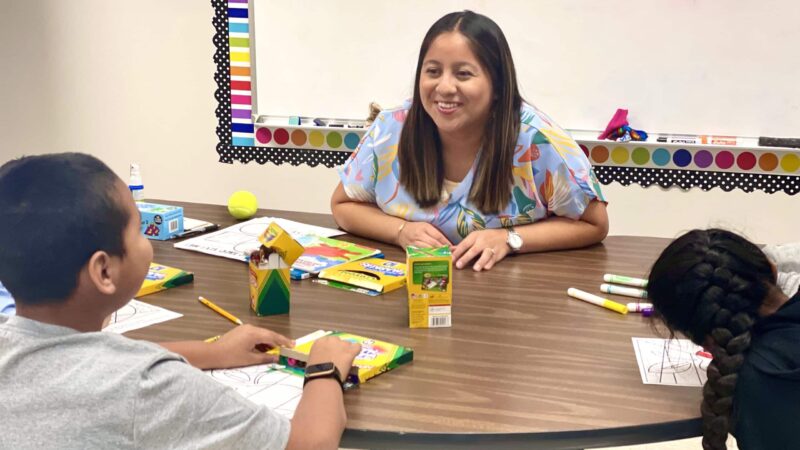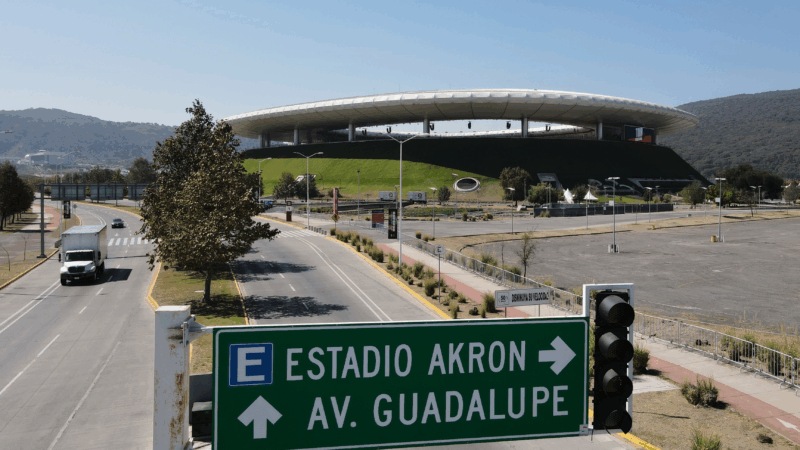How one small town is teaching English to kids of immigrants
Lety Vargas, a newly hired English Language teacher in Russellville, coaches small groups of students on her first day of school.
By Rebecca Griesbach, al.com
RUSSELLVILLE, Ala. — As part of an exercise to help the class learn English, a third grader pulled a block from a Jenga tower and read aloud a question written on one side. “Where,” the boy read, then slowly sounded out the other words: “Where would you like to visit?”
“Disneyland,” one student said. “Space,” another classmate chimed in. “Guatemala,” said a girl with a bright blue bow.
Kathy Alfaro, a new English language teacher at Russellville Elementary, exchanged a few words with the girl in Spanish and then turned to the other students. “Do y’all know what she said?” Alfaro asked the class. “She said she has a lot of family in Guatemala because she was born there. And I told her that I was born here, but I also have a lot of family in Guatemala.”
This northern Alabama community with large numbers of Hispanic immigrants is using federal COVID-19 relief money for an experiment to serve students who are still learning English. They are hiring and certifying more local, Spanish-speaking staff, like Alfaro. She was previously a Spanish teacher, but took a new role teaching children the English language.
More than half of 2,500 students in the small Russellville city school district identify as Hispanic or Latino, and about a quarter are still learning English — known as EL students.
But the district at times has struggled to find the people and money necessary to help EL students achieve. It typically takes five years of intensive, small-group instruction, on top of regular classes, to help a student learn English and perform well in a regular classroom.
In addition to helping more local students succeed, Russellville aims to be a model for the rest of the country.
“We were trying to teach an increasing number of EL students with predominantly white teachers that speak English,” said Superintendent Heath Grimes. “And I’m like, ‘Why are we not using resources that we have in our community?’”
As a group, English learners performed lower on language proficiency tests during the pandemic. Experts say that may be because many students lacked good access to online classes at home, or because schools struggled to transfer in-person EL help to remote environments.
Russellville appears to be bucking that trend.
Districtwide, the percentage of students who met their language proficiency goals increased from 46% in 2019 to 61% in 2022. At the two elementary schools, proficiency jumped by nearly 30 percentage points.
“We’ve never seen a number like that before,” said Grimes, who credits new EL teachers and aides for the boost.
Some of the nation’s largest districts, according to the Education Trust, used pandemic relief money to hire bilingual staff. As federal aid money begins to run out and schools prepare for post-pandemic budget cuts, experts and advocates warn against reducing support for EL programs and other interventions.
“Our overreliance on federal funds and temporary funds potentially demonstrates that we’re not doing enough as a state already,” said Carlos Alemán, director of the Hispanic Interest Coalition of Alabama. “As we see those dollars wind down, then the state should really reflect and review what it can do to make sure that these programs can remain in place.”
Russellville school officials are working on ways to sustain the new roles — and holding out hope the state will boost long-term funding for EL education.
State funding for English language programs is limited, but growing. The state legislature approved $2.9 million for schools with large EL populations in 2018, and that amount grew to $16 million last year.
Leaders at the Alabama State Department of Education are asking for more room in this year’s budget for EL specialists and regional coordinators.
“We want to make sure that if students come to this country, if they’re not able to read, that they learn to read quickly and in English,” state Superintendent Eric Mackey said. “We’re going to continue to invest in that, because it’s our belief that every child deserves a high-quality education.”
Advocates say money for EL students often falls short, especially in rural districts that struggle to fund schools.
“It takes a lot more money to educate a child that does not speak your language,” said state Rep. Jamie Kiel, a Russellville Republican, who has called for putting more money toward EL students in the state budget.
Alfaro is one of three EL staffers at her school. They join about 20 other EL educators, aides and translators in the district — nearly half of whom are paid with COVID-19 relief money.
At West Elementary across the street, Elizabeth Alonzo, who is in her second year as an EL aide, said she never expect to have such a role -– mostly because there were few bilingual teachers in her school growing up, but also because she didn’t think she had the qualifications.
Alonzo is finishing coursework through a teacher training program called Reach University, which is contracting with an increasing number of Alabama districts to help certify more local staff.
“Whenever I started kindergarten, I didn’t know a word of English, so I struggled a lot,” she said, noting that an older cousin would often have to come to her class to translate what her teacher was saying. “That was one of the reasons why I wanted to do this, because I want to help those students.”
Trisha Powell Crain contributed to this story. The Alabama Education Lab team at AL.com is supported through a partnership with Report for America.
This story is part of Tackling Teacher Shortages, a collaboration between AL.com, The Associated Press, The Christian Science Monitor, The Dallas Morning News, The Fresno Bee in California, The Hechinger Report, The Seattle Times and The Post and Courier in Charleston, South Carolina, with support from the Solutions Journalism Network.
U.S. and Iran to hold a third round of nuclear talks in Geneva
Iran and the United States prepared to meet Thursday in Geneva for nuclear negotiations, as America has gathered a fleet of aircraft and warships to the Middle East to pressure Tehran into a deal.
FIFA’s Infantino confident Mexico can co-host World Cup despite cartel violence
FIFA President Gianni Infantino says he has "complete confidence" in Mexico as a World Cup co-host despite days of cartel violence in the country that has left at least 70 people dead.
Supreme Court appears split in tax foreclosure case
At issue is whether a county can seize homeowners' residence for unpaid property taxes and sell the house at auction for less than the homeowners would get if they put their home on the market themselves.
Top House Dem wants Justice Department to explain missing Trump-related Epstein files
After NPR reporting revealed dozens of pages of Epstein files related to President Trump appear to be missing from the public record, a top House Democrat wants to know why.
ICE won’t be at polling places this year, a Trump DHS official promises
In a call with top state voting officials, a Department of Homeland Security official stated unequivocally that immigration agents would not be patrolling polling places during this year's midterms.
Cubans from US killed after speedboat opens fire on island’s troops, Havana says
Cuba says the 10 passengers on a boat that opened fire on its soldiers were armed Cubans living in the U.S. who were trying to infiltrate the island and unleash terrorism. Secretary of State Marco Rubio says the U.S. is gathering its own information.







